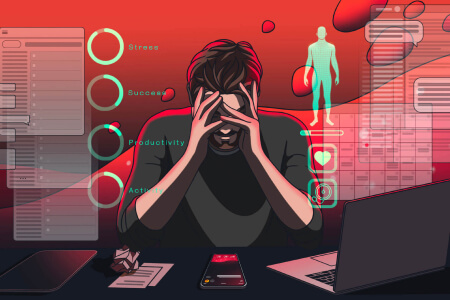
Stress & Energy. Tracking and reducing stress with Welltory HRV
We calculate your level of physical stress and energy based on the evaluation of heart rate variability.
Home » Stress & Energy » How to restore the energy

77% of our users experience fatigue, and the main reason is lack balance between stress and recovery. Learn to manage your energy and avoid fatigue
There are two reasons for low energy levels: either we expend more energy than we have, or we don’t restore our energy reserves.
We expend energy in many ways, including:
Stress
When we experience stress, high-speed processes are activated in nerve cells even if we don’t need to run anywhere. Stress hormones increase our blood pressure and heart rate. They activate energy consumption in the nervous tissue. This occurs because such a response once helped us run away from enemies or predators. Our body gets energy for high-speed processes from carbohydrates, while other processes are fueled by fats.
We can’t store a lot of carbohydrates — we can only store fats. This is because people previously worked more with their muscles. They needed more fats than carbohydrates. Once these fats are exhausted, we begin to experience a lack of energy, or we turn to sugar. When we consume excess sugar, our body attempts to “protect” itself, resulting in impaired glucose tolerance and diabetes. So, reducing stress is an effective way to provide yourself with energy for the whole day. Snacking on sweets isn’t.
Fear
“Fear sells.” This slogan defines the modern world. Dismal daily news and dire forecasts for world affairs increase our anxiety. A high level of stress caused by fear negatively affects the production of hormones which participate in supplying energy. It leads to suppression of the hypothalamus, which participates in the processes of energy regulation.
Why energy reserves don’t recover:

There are other ways to recoup energy:
Physical energy. This is the basic level (remember how hard it is to work and stay in a good mood when you are sick). This energy is maintained through nutrition, physical activity, keeping healthy, and muscle recovery.
Emotional energy. This is our mood, which helps us to be physically and intellectually productive. Our brain works better when it feels optimism and adventure or responds to challenges and opportunities. Any activity that brings a sense of joy, self-realization, and self-affirmation is a source of emotional recovery.
Intellectual energy. This is the ability of your prefrontal cortex to turn on. It can be different during the day: it is at its highest in the morning after awakening, decreases during lunch, and rises in the afternoon. Intellectual energy is maintained by the balance between periods of mental stress and recovery. Perfect balance is reached by people who work for 60 minutes in a state of concentration and then actively recover for 20 minutes.
Motivation. This is what inspires us. It’s our confidence in following our chosen path, especially at challenging moments when we face difficulties. Many books on self-improvement suggest that one begins by defining one’s values and goals in life because motivation helps overcome fatigue and physical limitations. We have noticed the opposite effect: if you learn how to relax physically, increase energy, and reduce stress, it will be much easier for you to start up an internal mechanism of positive change and to determine your values and goals.
You can either totally relax your body or activate your emotions and brain.
Here’s how you can totally relax your body:
And here are some alternative activities you can try:

You can either take a break from stressful emotions or focus on activating positive ones. Here are a couple of ways to relax emotionally:
To switch on positive emotions, choose an activity that brings you feelings of happiness, self-realization, and self-affirmation.
We are surrounded by information all the time. News alerts, work updates, and social media all take a lot of mental energy. The result is often information overload, which exhausts the brain and leads you to make bad decisions. So what can you do about it?
You want to either relax your brain or switch to physical activity.
Here are some ways you can relax your brain:
This means cutting back on the information you consume. Here is how:
Exercise releases feel-good endorphins that focus your mind and can make it easier to sleep. It also promotes communication among the body’s physiological systems, enabling the body to handle stress better. A recent meta-analysisindicates that exercise benefits people with stress- and anxiety-related disorders.

Motivation is the impulse to act. Neurologically, there is evidence that motivation may be connected to dopamine levels in the brain, while psychologists tend to correlate motivation with such concepts as autonomy, value, and competence. To regain your motivation, you need to take care of yourself physically and find value in what you do.
Here are some specific steps you can take:
Ask yourself: why is this job important to me? What unique ideas or capabilities do I bring? Is there another way I could be looking at today’s major tasks? Maybe you can even carve out some time for yourself during the week to think about creative workplace solutions, tackle problems from new angles, and try new tasks.
Regaining your motivation can take some time and effort. But once you find it, you will have a powerful source of energy to carry you through the days ahead.
This is where the data comes in. Sure, you feel better in the moment. But how do you know that your relaxation techniques are improving your well-being and energy levels in the long run? Take a measurement in the Welltory appusing your smartphone camera or your Apple Watch.
Your Stress, Energy, and Health scores are calculated based on the standard HRV metrics (RMSSD, SDNN, etc.) To make the results easier to understand, we illustrate them with liquid — you can see when you’re literally boiling over with stress or when your focus is too low for any activity but rest.

By using Welltory’s measurement technology, you can see the effects of your relaxation techniques. Connect Welltory to other apps on your phone to gather more data and see the effects more clearly.
Remember to check your Energy and Stress levels every morning. Has your energy level risen? Has your stress level gone down? By tracking this data, you can clearly see how your body is responding. Compare your readings on different mornings after trying various relaxation techniques. Which worked best for restoring your energy?
Once you find something that works, you’re ready to make effective relaxation a permanent part of life.
Welltory Team, upd. 09 Sept. 2022

We calculate your level of physical stress and energy based on the evaluation of heart rate variability.

Professional burnout is a result of long unresolved job stress and it has become a popular diagnosis recently. Find out if you are at risk and how to avoid it.

85% of us experience stress on a daily basis. Find out is stress always bad, what causes it and how to avoid chronic stress.
 App Store
App Store
 Google Play
Google Play
 Huawei AppGallery
Huawei AppGallery
 Galaxy Store
Galaxy Store







